Spain continued its reign at the third Artistic Swimming World Cup stop in Markham, dominating nearly every event it entered. The team picked up nine medals across the 11 events it participated in, including five golds, and seemed to have a hand in nearly every podium. Meanwhile, Maria Alavidze made history for Georgia, earning the country’s first-ever medal in any major international artistic swimming competition, with a silver in free solo.
Starting with Spain, the squad walked away with gold in technical mixed duet, free mixed duet, technical team, free team, and free duet. Add to that a silver in technical solo, technical duet, and acrobatic team, and a bronze in the mixed free duet, and it’s safe to say this team is comfortably at the forefront of the World Cup season.
Besides the outstanding “Madness” free team, the other highlight surely continues to be the free mixed duet of Iris Tio and Dennis Gonzalez Boneu. The routine, set to Led Zeppelin’s “Babe I’m Gonna Leave You” racked up even more 10s in artistic impression, this time earning four: three in performance and one in transitions.
We’ve gone over this routine extensively already during the Soma Bay World Cup leg, but all in all, it is a masterpiece. If you haven’t watched it yet, do it now and stop missing out on a true piece of art. And some goosebumps.
Tio also returned to the free solo event for the first time since the 2023 World Championships with a new routine to “Hymne à l’Amour” by Céline Dion. It was a beautiful and emotionally mature performance, which earned the highest artistic impression score of the final, but sadly, one basemark knocked her down to fourth.
Gonzalez Boneu made his debut in the acrobatic team routine, and was notably the flier on the first acrobatic move, which earned yet another 10, from the execution panel this time. The routine did receive two basemarks, which put it behind Italy but still held on for silver with a strong artistry, in what was otherwise a rather chaotic final.
Overall, the Spanish squad and coaches are undoubtedly pushing the sport in the right direction. What makes their dominance so exciting is that they’re doing it without chasing the highest difficulty. Sure, they remain competitive there, but instead they put a strong emphasis on clean execution, smart choreography, and high artistic impression.
And, it’s working. They’re showing what’s achievable with intention, effort, and creativity, and in the process, are creating real buzz around the sport again.
“I really want to eliminate the concept that we cannot be artistic with the new system,” head coach Andrea Fuentes said. “Everything is possible, we just need to get out of our box, even if it seems more difficult. We can work our brains and express our creativity, so together we build the synchro we all want, one that has both of the new and old system, more fairness but the same artistry that we had before. All our efforts with the team are into not only doing the artistic well, but also the execution. We can change the game this way instead of only having difficulty at any cost.
The coaches also have a responsibility for athlete safety. I know we all want to win, but I believe we’re making a big effort with our team to show that not only DD matters. We have the chance to not make traumatic and dangerous choreographies for the athletes. So, in my role, the only power I have is to prove that we can also have good results without putting our athletes at risk. That’s my first, most important goal, and then to show that artistic swimming can be artistic again.”
Another standout moment of the meet came from Maria Alavidze of Georgia. After countless near-misses and fourth-place finishes, including in both Paris and Soma Bay World Cups, she finally broke through.
The 18-year-old delivered a touching “Memories” free solo to clinch the silver medal. This is Georgia’s first-ever medal in a major international artistic swimming competition, and obviously a huge moment for both her and the country.
“I can’t feel it yet, I’m so so excited,” she said afterward. “It’s the first-ever medal for Georgia at world-class events and it doesn’t feel real. I’ve had so many fourth places, but if I were to win a medal, I wanted it to be deserved, because with the new rules, you could end up in the top because of someone else’s mistake. So, this is really amazing, I’m so happy with my performance, and of course this result.”
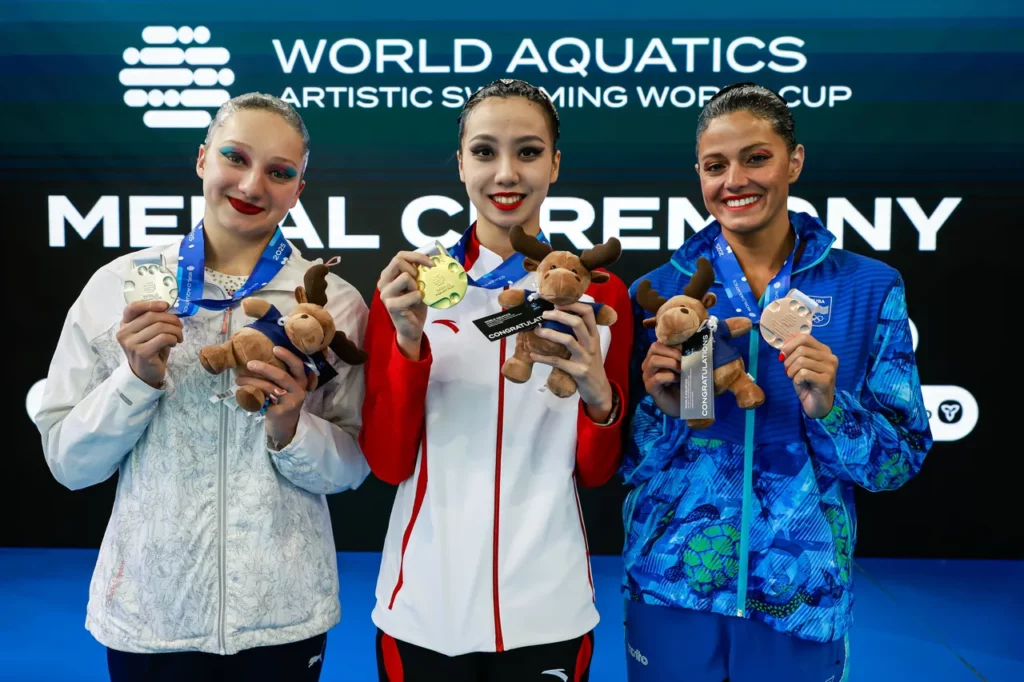
China was also a big presence in Markham, picking up seven medals including three golds.
The solo events were all about World medalist Xu Huiyan, as the 19-year-old won both technical and free solo events by fairly comfortable margins.
Her “Love Sickness” technical solo notably saw her edge out Spain’s Tio this time around. The two were about a tenth apart at the Paris World Cup, with Tio taking the gold then. In Markham, Xu however took a more commanding lead, finishing ahead by over five points while actually having slightly decreased her DD.
Teammate Guo Muye also picked up gold in the men’s free solo, and the Lin twins contributed bronze in the technical duet and silver in free duet. The Chinese squad also took two more silvers in both mixed duet events, leading to a very encouraging outing as the nation gets ready to compete at home in the upcoming World Cup Super Final.
The Alexandri triplets of Austria made a splash in their first World Cup of the year, with Anna-Maria and Eirini-Marina taking gold in the technical duet in their first appearance since the Olympics Games, where they had finished fourth.
“After the Olympics, we were disappointed and the first couple of weeks were a tough time for us,” Anna-Maria said. “We thought a lot, and decided to continue because of our love and passion for the sport. We trained for five months alone, until February. It was a difficult period because we were for so long without a coach, so we had to think and plan our training by ourselves, and help each other with corrections.”
Indeed, on top of the heartbreak of the Games, the triplets had to face the retirement of their longtime coach Albena Mladenova at the end of 2024. The hiring of their new coach, Nakajima Takako, former head coach of Japan’s national team, was only finalized and announced by the federation in February, with Nakajima making the move to Austria shortly thereafter.
“We started training with Takako just two months ago, so we are still getting to know each other,” Anna-Maria continued. “But from the very beginning, we had a really good chemistry. It’s great that we start a new cycle very refreshed, and everything is new, including our coach. It has been a big change for us, but it’s a new energy. We are all very motivated and eager to work together. We think that the best of us is yet to come, and we still haven’t shown it yet.”
Their new “Swan Lake” technical routine was sharp, and executed with the typical Alexandri precision and technical skills. This theme may sound familiar, as their free duet choreography during the Rio Olympic cycle was also set to Swan Lake, albeit a different part of the composition.
In Markham, the sisters came in strong and delivered under pressure, with the highest difficulty (35.00) of the field, to claim the top spot.
“We felt really good during our swim,” Anna-Maria said. “Swan Lake is music that we love. It was a unique version that highlighted our elegance, but also our strength and sharpness in the water. So, we wanted to maintain a very good execution on the elements and the hybrid, but also include a very artistic performance and move the people. We enjoy swimming this routine a lot so we wanted to transmit this feeling to the audience too.”
Their sister Vasiliki also made her return to competition after nearly a year and picked up bronze in technical solo. Her new “Cleopatra” routine was powerful, intense, and technically excellent, just what you’d expect from the reigning European champion.
“I felt very good during my swim,” she said. “It’s a very new routine. I think I did a very good job on the interpretation of the theme and music, and also maintaining a very good execution on the elements. I really loved and enjoyed the process of creating this choreography so much, and I think it’s notable especially on the transitions and arm movements. It was a very good first meet after 11 months since my last competition, but there is a lot of room for improvement. I will now make some changes to be at my peak level for the Europeans in June and Worlds in July.”
Great Britain’s Ranjuo Tomblin continued to build his résumé with another gold in the men’s technical solo and a bronze in free solo, where he debuted a new routine set to “Rock Me Amadeus” by Amadeus Electric Quartet. He also showcased a new free mixed duet routine with Holly Hughes to a “Snakes” theme, but two basemarks on their pair acros pushed them down to fourth.
In the acrobatic team event, Italy stole the show (and the gold) with their high-energy and entertaining “Chicago” routine, delivering a strong and confident performance when it mattered most. In a final where every other team struggled to execute their acros, the Italians’ precision, consistency and showmanship stood out.
Japan didn’t bring duets or an acrobatic routine, but still left its mark with silver medals in both technical and free team events.
17-year-old Olympian Higa Moe made her much-awaited return to international solo competition with a new program choreographed by Masayo Imura, which was actually set to some of the same music Inui Yukiko used for her 2023 Worlds-winning solo. Higa held her own in a very strong field, finishing fourth with promise for what’s to come.
France and the U.S. picked up two bronze medals each in Markham. France’s medals came in the acrobatic team and the free duet, where Laelys Alavez and Romane Lunel edged out Ukraine by the smallest margin of 0.0701 points (!) for the bronze with their “Octopus” routine.
The French also had a surprise in store in the technical team event, saying goodbye to their Olympic “Space” routine and revealing a new, fun routine set to a mashup of some famous DJ songs, like Bob Sinclar’s “Rock this Party” or Martin Solveig’s “Everybody”.
The Americans secured their podium finishes in the technical and free team events. In the latter, they unveiled their new routine called “The Body,” choreographed by Biz Price. It was a captivating and cleverly detailed piece, with each lap dedicated to a different body part: lungs, heart, brain, and the nervous system.
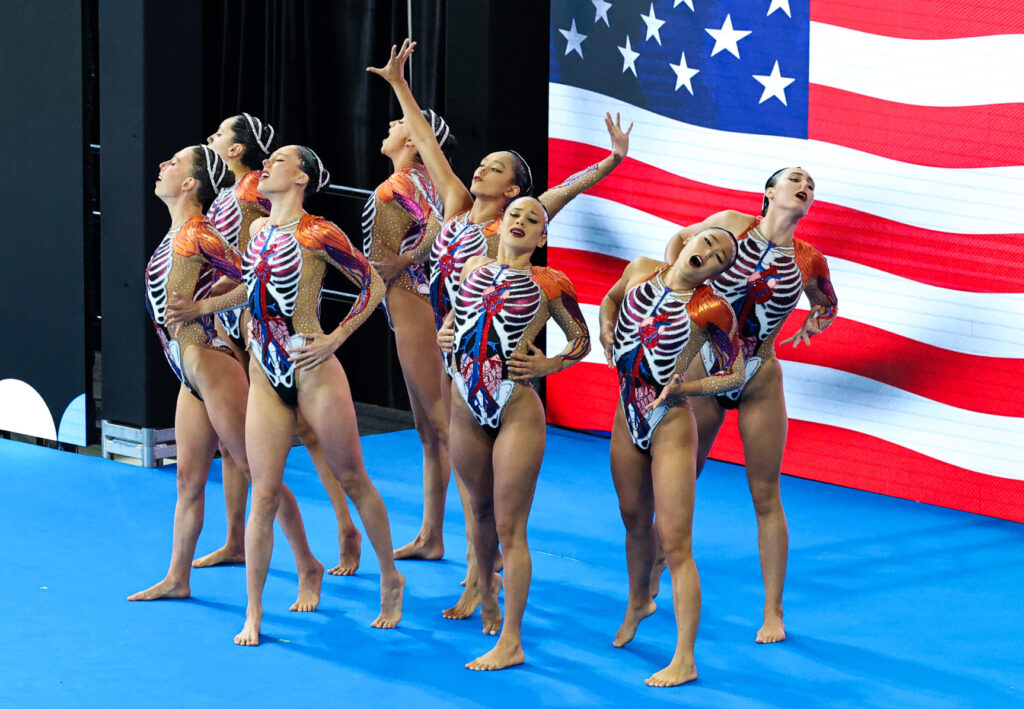
In its first outing of the season, Mexico also impressed in a few events. Fernanda Arellano and Itzamary Gonzalez showed great potential, and looked like they had never left despite a few years away from the duet event. They finished fifth in the technical duet, with an engaging and clean performance to music by Locomia.
The mixed duet also earned bronze in the technical routine despite a basemark, and Diego Villalobos grabbed silver in both men’s solo events, making quite the splash with his Joker-themed free solo, complete with a clever mid-routine makeup “change.”
Two other athletes who reached the podium in Markham were Kyra Hoevertsz of Aruba, who earned bronze in free solo, and Colombia’s Gustavo Sanchez, who took bronze in men’s technical solo. Both are adding to their growing collections of international medals and continuing to put their nations on the map.
Finally, a special shoutout to Teresa Sun of New Zealand, who at just 14 was the youngest athlete of the meet and had the daunting task of kicking off the entire competition. Coming off a bronze medal in free solo at the U.S. Youth Nationals just days prior, she showed impressive composure and technical skill well beyond her years, and is definitely one to keep an eye on.
Also worth highlighting was Canada’s new acrobatic routine to the theme of “Spiders”. It brought a nice creative and theatrical flair to the final, and the home crowd clearly loved it. The choreography already shows the touch of new head coach Karine Doré, with a clear artistic direction and choices. It didn’t all come together just yet as the squad received two basemarks, but the groundwork is there.
“The swim felt amazing,” Laurianne Imbeau said. “Just being as team, together, in front of our home crowd. People were screaming, I was saying it actually was difficult to look at the judges because people were all over, just screaming for us. It was so fun to swim and feel our country’s support.”
The 2025 World Cup circuit will wrap up in Xi’an, China, for the Super Final scheduled mid-June.
Beforehand, all European nations will head to Madeira for the European Championships starting on June 2, while a few teams of the Americas will aim for the inaugural Pan American Championships in Medellin in a few weeks.
ARTICLE BY CHRISTINA MARMET
Cover photo: Antoine Saito / World Aquatics
If you’ve enjoyed our coverage, please consider donating to Inside Synchro! Any amount helps us run the site and travel costs to cover meets during the season.

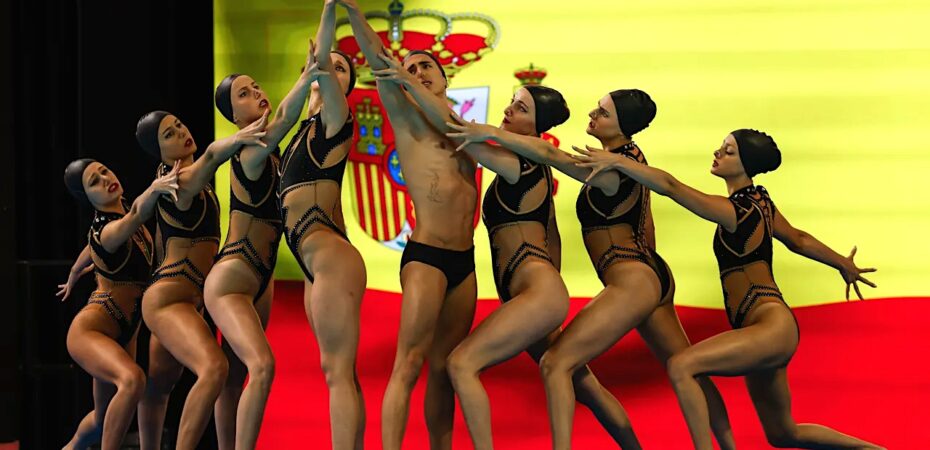
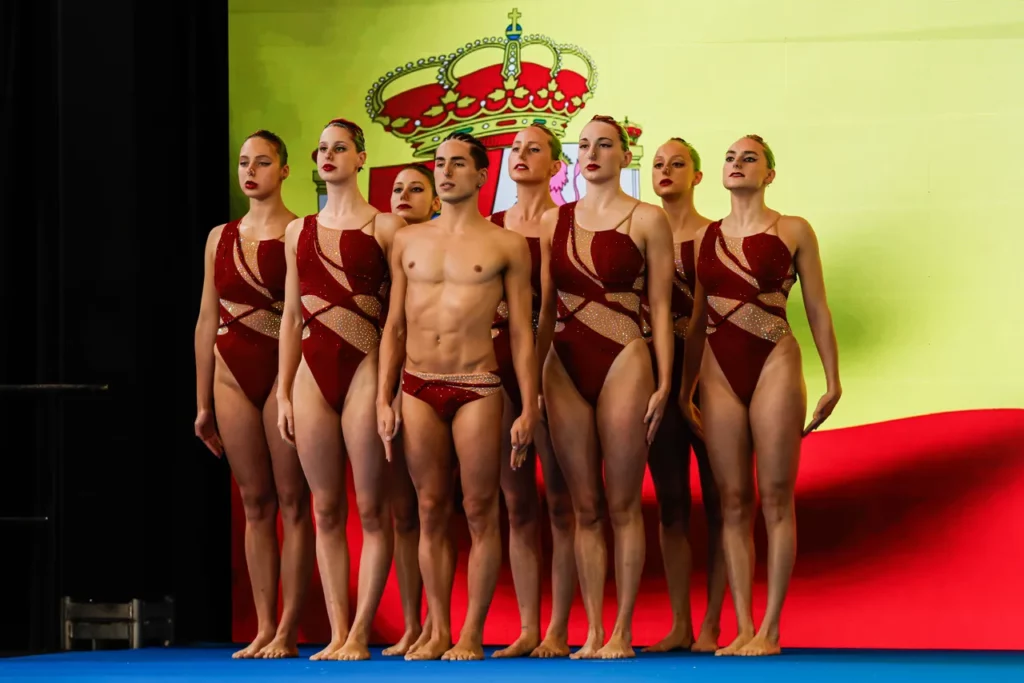
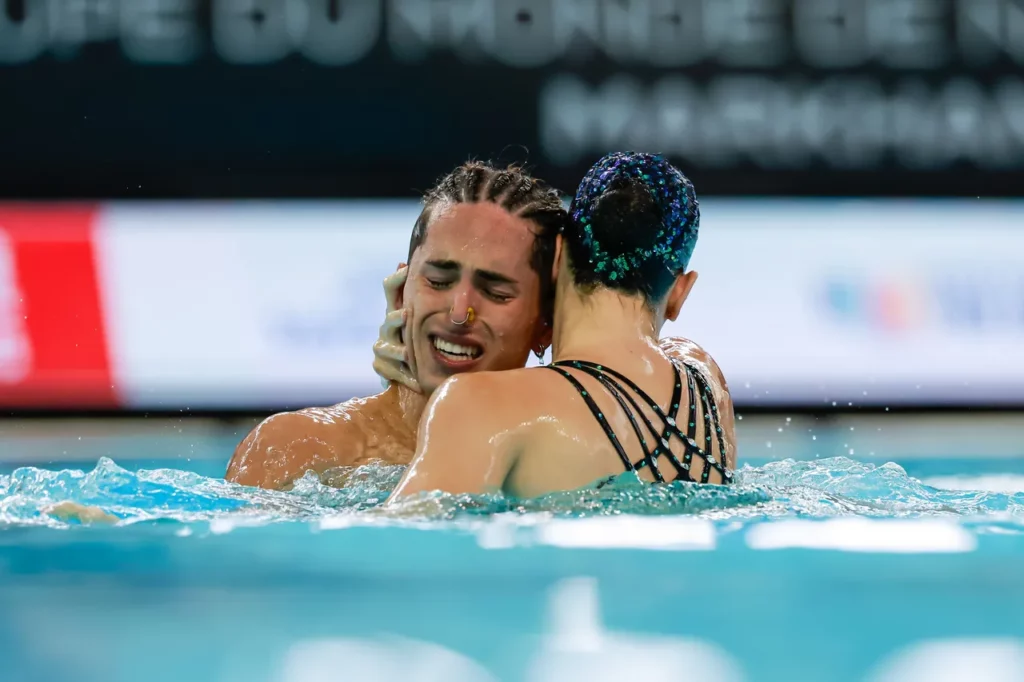
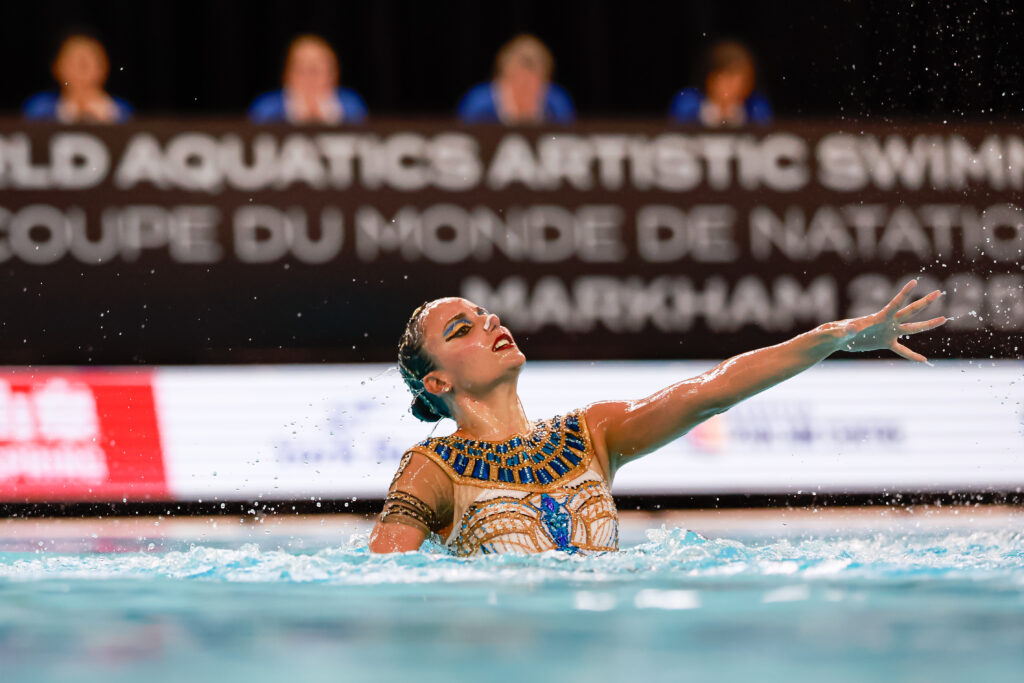

[…] Idea original Inside Synchro […]